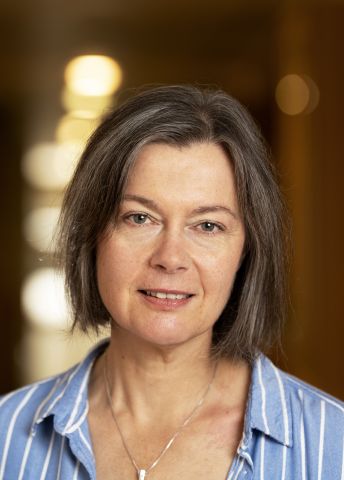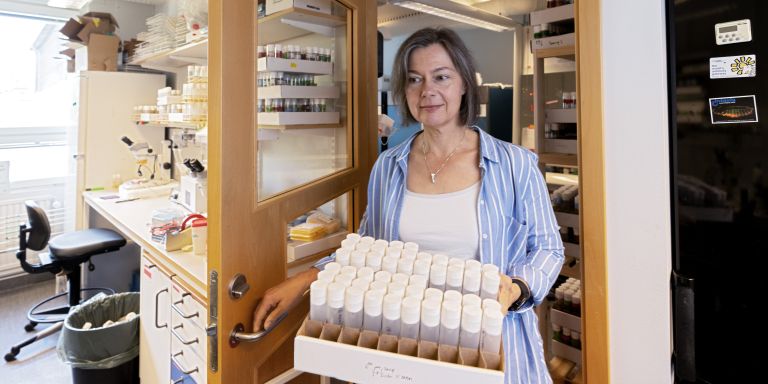
Ruth Palmer
Professor of Molecular Cell Biology
Wallenberg Scholar
Institution:
University of Gothenburg
Research field:
Cell and molecular biology with a translational approach


Wallenberg Scholar
Institution:
University of Gothenburg
Research field:
Cell and molecular biology with a translational approach
Palmer, who is a molecular biologist, researches cell communication and what can happen when information exchange between cells misfires. For many years she and her colleagues have focused on ALK (anaplastic lymphoma kinase), a molecule involved in complex interaction with surrounding cells, impacting multiple processes in the body.
“It’s fascinating to work on a molecule involved in so many processes that we don’t fully understand. But what we do know for sure is that there will be clinical consequences if ALK is activated in the wrong way or in the wrong place in the body. In that sense ALK is an undesirable facilitator, given that it has the potential to cause cells to become cancerous,” Palmer explains.
In some patients ALK plays a key role in the development of neuroblastoma. This form of cancer usually affects children under the age of two, and treatments involving chemo- and radiotherapy can be very grueling, with severe side-effects for those who survive.
Treating neuroblastoma with ALK inhibitors that deactivate ALK molecules is a much less harsh method that has yielded promising results. Palmer’s research team has already made important contributions to these developments, but more knowledge is needed.
“Neuroblastoma can develop when the ALK molecule is overactivated. If everything works as it should, the molecule is switched on and then off again, but control of cell growth misfires if the window is not closed and activation continues. We need to know more about this. “We have to understand the processes both when they operate normally and when they don’t,” Palmer says.
Much of this research is taking place in the laboratory environment, where the researchers are studying genetically modified fruit flies and mice carrying similar mutations to those found in neuroblastoma patients. The team is endeavoring to learn more about the key processes behind how and when ALK is activated, so that even better therapies can be developed.
“ALK inhibitors have already been used on a modest scale, and several children have had complete responses. But we haven’t completely cracked the code for the most efficacious use of ALK inhibitors. What weaknesses are there; what is the risk of resistance; should this therapy be combined with others? We have plenty to look into,” she says.
The research team also hopes to find better diagnostics to improve the chances of identifying which children with neuroblastoma can be helped by the treatment.
“Better knowledge of ALK activation might mean that a tissue sample could show whether the ALK molecule is activated, and whether ALK inhibitors can therefore be deployed,” Palmer explains.
She is optimistic about the future, and believes that the prognosis for children with neuroblastoma will have changed beyond recognition in 10 to 15 years.
Being chosen as a Wallenberg Scholar is an honor. It’s a huge relief that I can now conduct my research in the way I want, with the resources and at the level required, for five years.
“I believe I’m contributing to a future in which children with cancerous ALK mutations can be cured, and in which the side-effects of the therapies are much milder. I also hope that we will get better at identifying all those capable of responding to the treatment. At present I think we miss some of these patients, so that would be fantastic,” she says.
Palmer is convinced that the research on ALK will pave the way for better cancer therapies, and she is glad to be a part of the progress being made. Her own research is driven by her abiding fascination for molecules and her desire to understand how they work. She developed this keen interest at a young age, which led her to study biochemistry at university, later followed by a PhD from the highly respected Imperial Cancer Research Fund, as it was then known, in London.
“I sometimes joke that I’m addicted to molecules! It’s so fascinating how they interact and cooperate, and there’s so much we don’t know about them. When I began my university studies, I found it extremely irritating that my questions often elicited the response: ‘we don’t know.’ We have more answers now, but even though our knowledge in this field is constantly improving, each question leads to ten more,” she says.
Palmer is happiest in the lab, where she can discuss research with her colleagues and concentrate on the project’s studies and experiments. Another source of pleasure is getting to teach students who are curious and interested.
“When I get a message across, I can see in the students’ eyes that they understand and think it’s fun – I find that really gratifying,” she comments.
But Palmer also points out that research is not for everyone. She believes research work has to be truly enjoyable in order to outweigh the drawbacks.
“A career in research is tough. The hours are long and the work is demanding – there’s always a risk of a project failing to deliver. Yet it’s often the toughest projects that ultimately yield the best results,” she says.
Text Ulrika Ernström
Translation Maxwell Arding
Photo Johan Wingborg
ALK stands for anaplastic lymphoma kinase. This is a molecule that penetrates the surface of neurons and acts as a receptor for a molecule outside. When it binds to ALK a process begins inside the neuron. The process is vital to development of the nervous system, and researchers think that ALK is normally only active for a limited period during fetal development. But in the mid-1990s it was discovered that the molecule also plays a key role in several forms of cancer. Mutations in the gene that codes for ALK may cause the receptor to remain constantly activated. This overstimulates growth and causes the cell to become cancerous.
Source: Swedish Childhood Cancer Fund